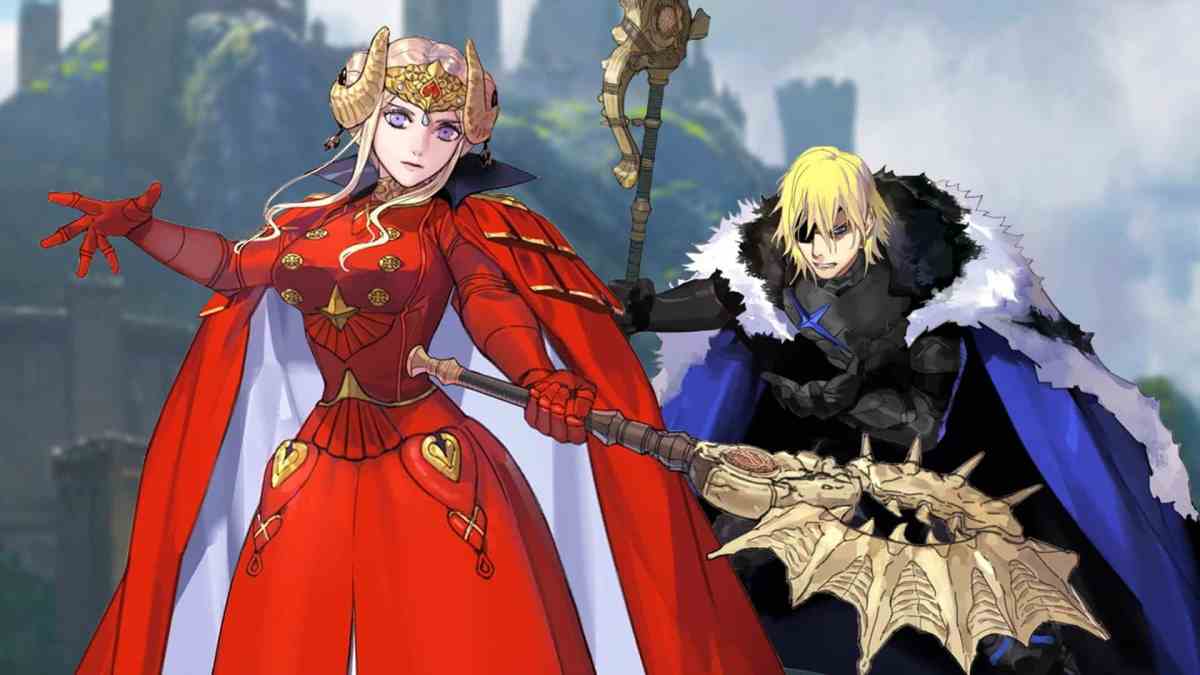When I first approached fanfiction as a topic, my goal was to highlight its strength as a means of dialogue between the audience and creator. Fanfiction writers undertake an act of inspired creation born of strong feelings towards the source material, to explore the aspects they feel most passionate about, and share their thoughts with others. Imagine my excitement then, when my writing from the perspective of an audience of fanfiction led to an opportunity for dialogue with one of my favourite fanfiction creators.
An Eagle Among Lions is a colossal work, by far the longest piece of Fire Emblem: Three Houses fanfiction published on Archive of Our Own. Written by Willow – also known as AMX004_Qubeley – it comes in at over 1.6 million words of fantastic science-fantasy fiction storytelling, with in-depth explorations of existing characters, and the creation of vibrant new ones that slot perfectly into the Three Houses universe.
I had the opportunity to chat with Willow – and her thoughts on the qualities of fanfiction, and its place in fandom as a whole, were too good not to share.
Read: Why Fire Emblem: Three Houses deserves all the fanfiction it can get
Creative freedom and personal expression are a major draw for Willow and many other fanfic writers when entering the medium. It’s undoubtedly true that the stories we experience in popular media are tailored to suit the perceived demands of the market. These creative constraints have led to, for example, the censoring of LGBT+ content for certain countries by major film producers like Disney, and the questionably propaganda-like takes on war in video game franchises, including Call of Duty.
But fanfiction doesn’t answer to those same constraints. In Willow’s words, ‘with fanfiction, you have a world and characters that are all set up for you, and you can literally write anything you want, and nobody can stop you.’
‘There’s something so wonderful about taking someone else’s story that meant the world to you, and using it to express the very deep and intimate parts of yourself that you might have seen reflected in them.’
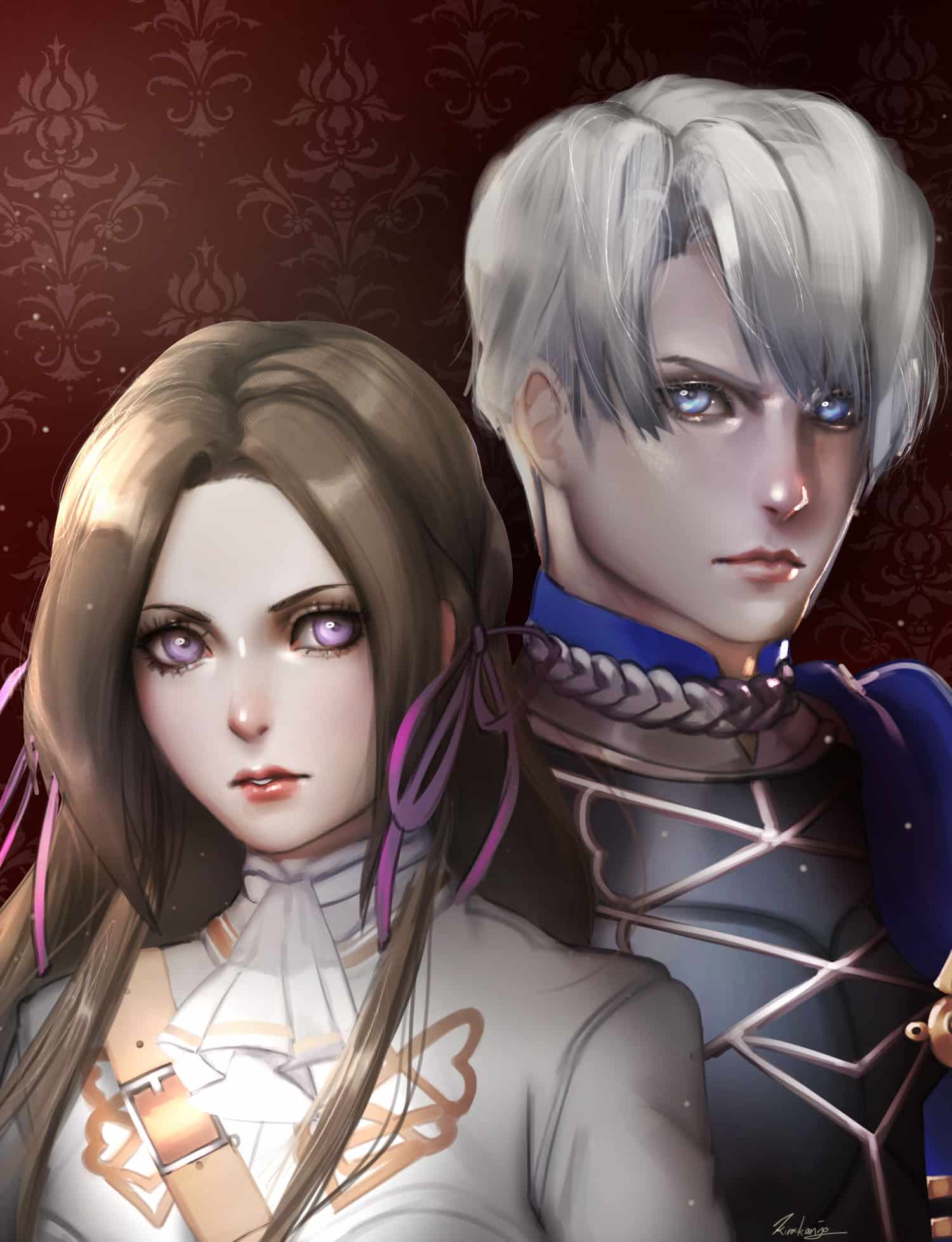
As a result, fanfiction is something of a haven for LGBT+ community content, a subculture that AAA media often still struggles to portray in a respectful or accurate manner. The transgender representation in An Eagle Among Lions is a prime example of this creative freedom in fanfiction allowing for a deeply moving interpretation of an existing story, and Willow’s thoughts on the character Hubert are well worth reading in full.
A question I’ve been asked before is whether fanfiction is really just derivative, or disrespectful to the original creator. When you’re taking someone’s story and writing in their universe, is that a mark of disrespect? I posed that same question to Willow, and I think her response is telling of the care it takes to want to write in someone else’s world.
‘I don’t think fanfiction is inherently disrespectful to the creator. You don’t write fanfic for someone else’s story unless you really loved it. There had to be some part of that story that burrowed into your brain and refused to let go.’
‘Even if you’re writing “fix-it fic” because you feel like a story went bad at the end, like your favorite TV series just completely whiffed it in its last season, or the final chapter of the book series you’ve been reading left a bad taste in your mouth, there’s still love there.’
The final takeaway I want to highlight from our conversation is fanfiction’s place in the dialogue between audience and creator. Willow describes it as a reaction to the gaps in the narrative, the ‘parts of the story that gripped them and never let go, and filled them with unanswered questions that they themselves are left to answer… Sometimes you meet a character in a work of fiction who says something very powerful about you, and you can take that thread, pull on it, unravel it, and see where it leads.
‘You can explore yourself through them, and you can explore them through yourself. That’s the kind of dialogue I’m thinking about as well.’
Fanfiction takes those burning questions, the bonds you’ve formed with characters you’ve found meaning in, and lets you explore them in a medium of creative freedom.
This is honestly the tip of the iceberg when it comes to the interview with Willow – the pieces I felt were most important to share in a discussion on fanfiction as a medium. But we talked about far more – how she started in fanfiction, an in-depth examination of Edelgard von Hresvelg as a character, and what it’s like to invent new characters in an existing universe – just to name a few topics.
If you loved An Eagle Among Lions, or if this article sparked your interest, I strongly recommend reading the full interview below.
Where did your experience as a reader and writer of fanfiction begin?
Willow (aka. AMX004_Qubeley): Reading fanfic started for me in late elementary school, way back in the early 2000s, when I was just getting into anime. But writing it didn’t happen until I was most of the way through high school, when I finally decided to stop daydreaming and actually put pen to paper.
I loved writing back then, but fanfiction was a step too far for me. I was too repressed back then. Eventually, though, I went on the EvaGeeks forums and started publishing a silly Neon Genesis Evangelion/Doctor Who crossover fanfic there, just starting a thread in their fanfic subforum and putting a chapter in each post.
I put the fic on hiatus right before I went off to college (right after publishing a cliffhanger leading right into the giant finale I’d planned), told everyone I’d be back, and never updated that thread again. Just like the First Doctor telling Susan he’d come back someday. In hindsight, that’s almost a better ending than I could have possibly written myself at that age.
I didn’t write fanfic again all through college, mainly because I was busy writing for class and also because my main hobby at that time was doing fan music for Homestuck (knowing I have Homestuck roots explains a lot about An Eagle Among Lions, honestly). Then, about a year and a half after I graduated, Undertale came out. I beat the game in one night, got the true ending, and immediately went straight to Archive Of Our Own to look up fanfiction.
I started reading Undertale fanfic when the fandom tag literally only had like one or two pages of works. And about six weeks later I finally started publishing my own Undertale fanfic. Everything before that was sort of a false start, really. And then a few years later when I got really into NieR: Automata, that was when I started really making friends in the community via my Undertale/NieR crossover fic Ghost in the Machine, which I probably wouldn’t hesitate to say was the first good thing I’d ever written. Fire Emblem came a few years after that.
I think Undertale was what really drew me in because it was my first time seeing what fanfic was really capable of. It was my first time really understanding that fanfiction is part of a dialogue – a dialogue about love and self-expression.
And you can use fanfiction not just to smash characters you like together like action figures and make them kiss like Rick Moranis in Spaceballs (though that’s obviously a huge part of the appeal), but also to express things that are very deep in your heart through a common “language” that everybody in the fandom knows.
When you describe fanfiction as ‘part of a dialogue’, what do you mean?
When I say fanfiction is part of a dialogue, first and foremost I mean that fanfiction is a dialogue between the creator and the audience. The creator creates a work, and the audience – the viewer of a movie or TV show, the reader of a book or comic, the player of a video game – reacts to it. And what fanfiction in particular is a reaction to are the gaps in the narrative, the threads that could have gone on longer, the characters and plotlines that could have gotten more attention, the potential that was there and unrealized (or, more likely, only partially realized).
And all good stories have these gaps. All great stories have these gaps. In Undertale, right away people wanted to know more about Sans and his backstory, they wanted to know more about what the heck was up with Gaster, and they wanted to do the one thing you can’t do in any route in the game – give Asriel the happy ending they wished he could have gotten. Those are just a few examples.
So the dialogue I’m thinking of is about fans showing appreciation for the parts of the story that gripped them and never let go, the parts that filled them with unanswered questions that they themselves are left to answer.
And then there’s also when a part of a story just really hits you right in the heart and rings true to you in a very personal way and inspires you to write in a way that builds that connection. And I’m mainly using trans headcanon fics as an example, which I’ve got a lot of experience writing. I and a lot of other writers have come across plenty of characters who gave off trans vibes that inspired us to explore our own feelings about and relationship to gender – and theirs – through fanfiction.
Sometimes you meet a character in a work of fiction who says something very powerful about you. And you can take that thread, pull on it, unravel it, and see where it leads. You can explore yourself through them, and you can explore them through yourself. That’s the kind of dialogue I’m thinking about as well.
And you can make your favourite characters boink each other. That is also a dialogue.
One claim often held against fanfiction is that it’s derivative, or ‘disrespectful’ to the creator of the original work. How do you feel about that claim?
I don’t think fanfiction is inherently disrespectful to the creator. You might be able to make a case for fix-it fic, if it’s written specifically because a fan disliked the course a story had taken, but I don’t think that’s inherently disrespectful, either.
You don’t write fanfic for someone else’s story unless you really loved it. There had to be some part of that story that burrowed into your brain and refused to let go. Even if you’re writing fix-it fic because you feel like a story went bad at the end, like your favourite TV series just completely whiffed it in its last season or the final chapter of the book series you’ve been reading left a bad taste in your mouth, there’s still love there.
Fanfiction can be disrespectful to the creators. Like, not to paint fanfiction with too rosy a brush. But so can the rest of fandom, and in my experience, any lack of respect for the creators I see in a given fanfic community for a work usually has its roots in some attitude in the wider fandom as a whole.
Do you think that creators could benefit from engaging more actively with fanfiction (or fan-created content in general)?
I think it’s honestly for the best for creators to be hands-off with fanfiction. Of course, back in the 90s, creators (or at least the corporate owners of their stories) were very hostile toward fanfiction’s existence – for example, you had Anne Rice suing people for writing fanfic and Fox sending cease-and-desists to sites hosting X-files fanfic, and that was a very bad time for creators and readers alike; I’m glad to see fanfiction being more openly accepted or at the very least tolerated now.
But if creators got too involved with fanfiction, I think it could get messy and ugly in a different way. Fandoms can be ugly places, and unlike fanart and cosplay, fanfics are entire stories of their own, with some even rivalling the originals in scope and length. I can see why creators might want to stay clear of giving certain fanfics their endorsement or even acknowledgement.
That said, I think creators should read fanfic of their creations (or maybe even write some of their own), and they should say that they do if they want to. But they shouldn’t say what fics they read/write, and if they have an Ao3 handle, they shouldn’t make it public knowledge. Keep the fandom on their toes. Keep them guessing. Always keep them wondering if the fic they just left kudos on was actually written by the author, or if the user who just left kudos on their own fic might be them in disguise…
I know there’s an author out there now who’s talked about doing that, although I’m blanking on their name at the moment. And I think it was Chloe Zhao who said that she chose to direct the Marvel Cinematic Universe movie Eternals mainly because she wanted to write fanfiction of her own for it.
It’s fair to say that you’ve written a lot about Edelgard von Hresvelg. What is it about her that you find so engaging?
I’d never cared very much about the Fire Emblem franchise until Three Houses came out. I’d tried The Sacred Stones as a kid and liked it enough until I hit a roadblock that my mediocre gaming skills couldn’t get past, and I was deterred enough by the series’ permadeath game mechanic (it might surprise you to know I’m actually incredibly bad at video games) that I didn’t give anything else in the series a shot… until Three Houses came out.
I bought that game because I’d heard that one of its main characters was a canonically gay villainess. And she had white hair, which was and remains to this day one of my favourite character design tropes. So I was instantly on board with her.
I played through Three Houses, got through the end of Edelgard’s route, Crimson Flower, and realized three things – one, everybody lied to me about Edelgard being a villain, because feudalism, false prophets, and the aristocracy were the real villains. Two, she was even gayer than I’d anticipated. Three, she was the best video game character I had ever seen.
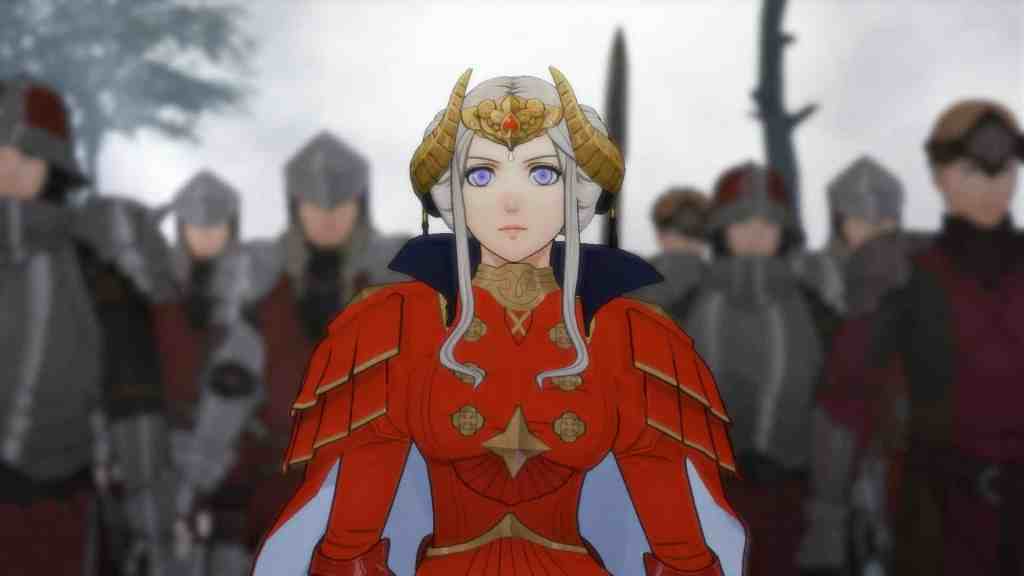
I think a friend of mine, Captain_Flash, author of the incredible Fire Emblem: Three Houses fanfic The Emperor and the Goddess (which I would not hesitate to call the best fic in the Three Houses fandom: if you ask me, nobody understands Three Houses‘ characters and story better than him save for the writers at Intelligent Systems/Koei Tecmo – and even then sometimes I have my doubts about them) put it best – characters like Edelgard usually don’t get to be the heroes of their own stories. They’re tragic cautionary tales for the heroes to cut down and feel bad about.
It’s very special that Edelgard is who she is: an unabashed radical queer woman grappling with trauma and resigned to playing the role of a villain in her quest to make a better world – and that she actually gets to win. Everything that Edelgard is, is an incredible queer leftist power fantasy that to this day I cannot imagine actually made it into a mainstream
The best thing about Edelgard is that she could have been yet another boring, cliched villain whose noble ideals end up corrupted by power or, worse, who turns out to be insincere in their ideals and turns out to have been evil all along. Almost every radical character in mainstream media ends up like that, because mainstream media wants to promote cynicism and pessimism about making the world a better place and challenging the status quo.
So Edelgard actually being righteous and meaning it genuinely feels like a breath of fresh air. I’d have loved Edelgard even if she’d gone down a more Paul Atreides route, but the fact that she didn’t (at least not in Crimson Flower, which I will argue to my dying breath will function as the true canon ending to the game to anyone who reads it in good faith) makes me love her even more. They straight up put a full-throated queer leftist power fantasy into a video game, using eternal fantasy feudalism as a metaphor for the post-cold war neoliberal ‘end of history, and it rules.
One of the other things I admire most about Edelgard is her focus and her commitment to her ideals. She may not seem like it on the surface, but she’s an idealist (and, of course, a romantic) through and through. She doesn’t get bogged down in base or self-serving urges like ‘revenge.’ Edelgard is laser-focused on the system; she saves her anger for the feudal system she is working to tear down, not the people in that system, not even the people whose horrible deeds are enabled by that system.
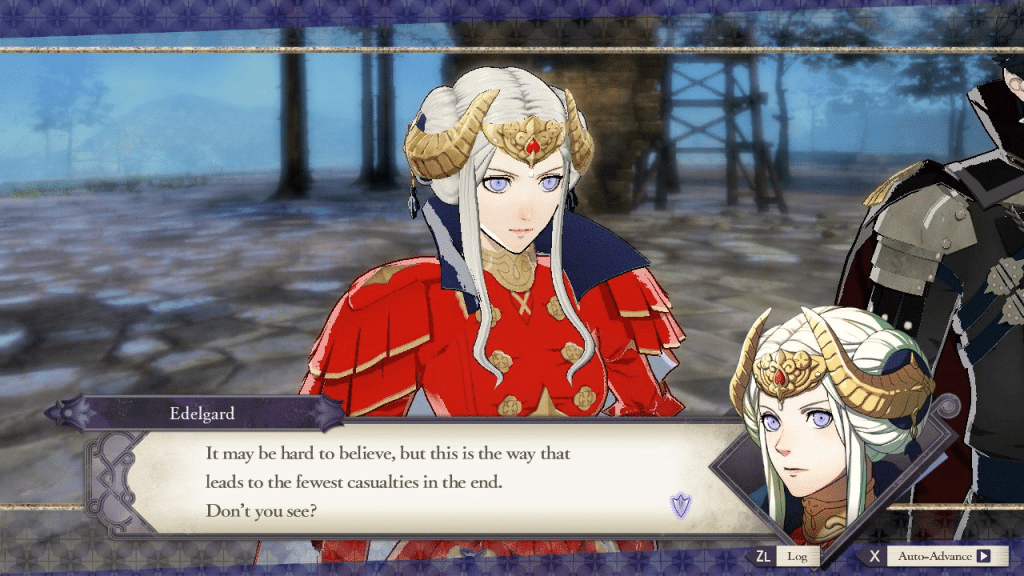
I once heard someone say: ‘It’s hard to be mad at a system. Systems aren’t people. They don’t have emotions. They’re normal.‘ That’s one reason why so many people I’ve met in the fandom don’t ‘get’ her. Edelgard doesn’t get mad at people. She doesn’t indulge in vengeance against the people who have wronged her, even though she could. She even shows mercy to her enemies, provided they allow her.
She gets mad at systems, and that is her greatest strength and the thing people struggle with the most when it comes to understanding her. Her composure and behaviour makes that ideological commitment look effortless, the way a star athlete makes winning an Olympic medal effortless or a great artist makes drawing or painting look effortless. She makes it look like the easiest thing in the world that she focuses on the system rather than antagonists like Duke Aegir and Thales, who are enabled by it, or Rhea and Seteth, who maintain and uphold it. There is an incredible core of selflessness to her character which more superficial readings of her character or the game’s story in general completely miss to their detriment.
And I don’t think I can talk about Edelgard without at least mentioning Terry Pratchett. Terry Pratchett is one of my favorite authors; his Discworld series blends an incredible sense of oddball humor and keen satirical eye with a burning humanistic passion and a real sense of rage at the injustices of the world. Neil Gaiman said it best when he said that Pratchett wasn’t jolly – he was angry.
There is a roar of common humanity all through his work, a militant empathy, an intense belief in human capacity for good, a laser-focused perception on what was really worth getting angry about, a fierce humanism that bleeds from every page even while you’re laughing out loud at it. I saw that same righteous anger that I felt from Pratchett’s books in Edelgard, and that, I think, is ultimately why the character spoke to me so strongly. She doesn’t have Pratchett’s humor but she has another powerful piece of his soul in her character.
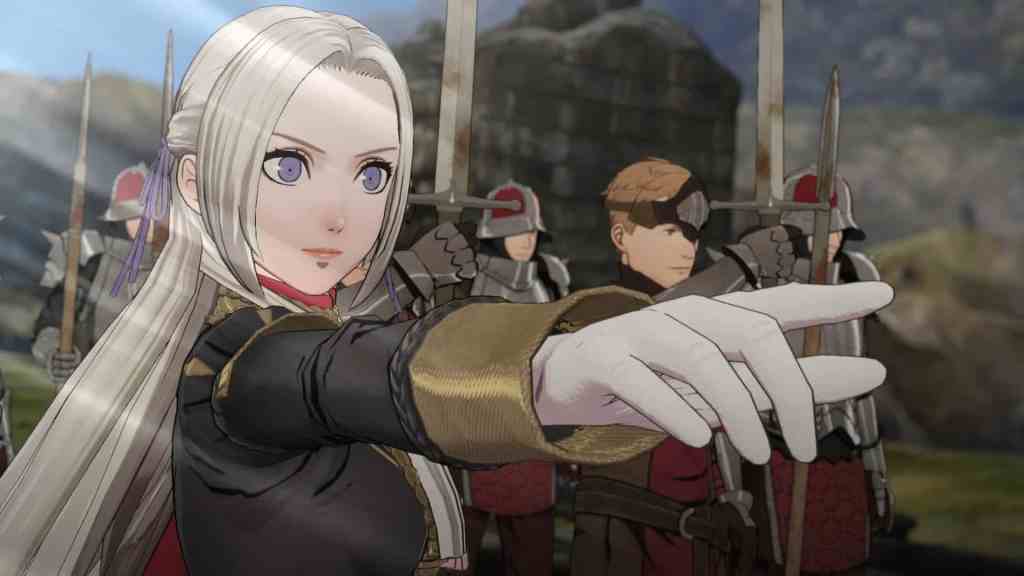
I also feel, though I doubt this was the creators’ intent, that Edelgard is basically Mary Wollstonecraft with an axe. Wollstonecraft’s A Vindication of the Rights of Men is a long, brutal takedown of fellow British political philosopher Edmund Burke’s pearl-clutching criticism of the French Revolution. Every word of it speaks to the philosophical tradition Edelgard is rooted in. Considering the game’s many references to Shakespeare and Victor Hugo, which do feel neither accidental nor superficial, I wouldn’t also be surprised if Wollstonecraft was an explicit inspiration for Edelgard as much as previous Fire Emblem archetypes and other historical figures such as Napoleon and Emperor Meiji so clearly were.
All of the most literate people I know love Edelgard to pieces, in all her complexity and all her flaws; it’s almost like she was written specifically to reward players who did as my 10th grade English teacher constantly exhorted our class to do and DELVED, as he would write onto the chalkboard in big block letters, into the game’s text.
I would love to know more about your thought process in developing Heidrun’s character arc. I always love seeing trans representation in fanfiction, though I don’t think I’ve seen very much involving Hubert. How did that come about?
I didn’t go into An Eagle Among Lions planning for Hubert to be a trans woman right at the beginning, but I’d already started developing that headcanon in a draft I’d been writing for a one-shot fic and it was already a headcanon that meant a lot to me – I just hadn’t conceived at the time that I would have the space for it in the story. An Eagle Among Lions wasn’t meant to get as big as it did; until chapter 9 or so I’d been intending to keep it short, no more than 20 chapters. But God laughs in the face of all my most conservative efforts, and as time went on and the story grew in scope I realized that I could fit Heidrun into the story. By about halfway through the fic I knew exactly how it was all going to go down, how Hubert would exit and Heidrun would enter.
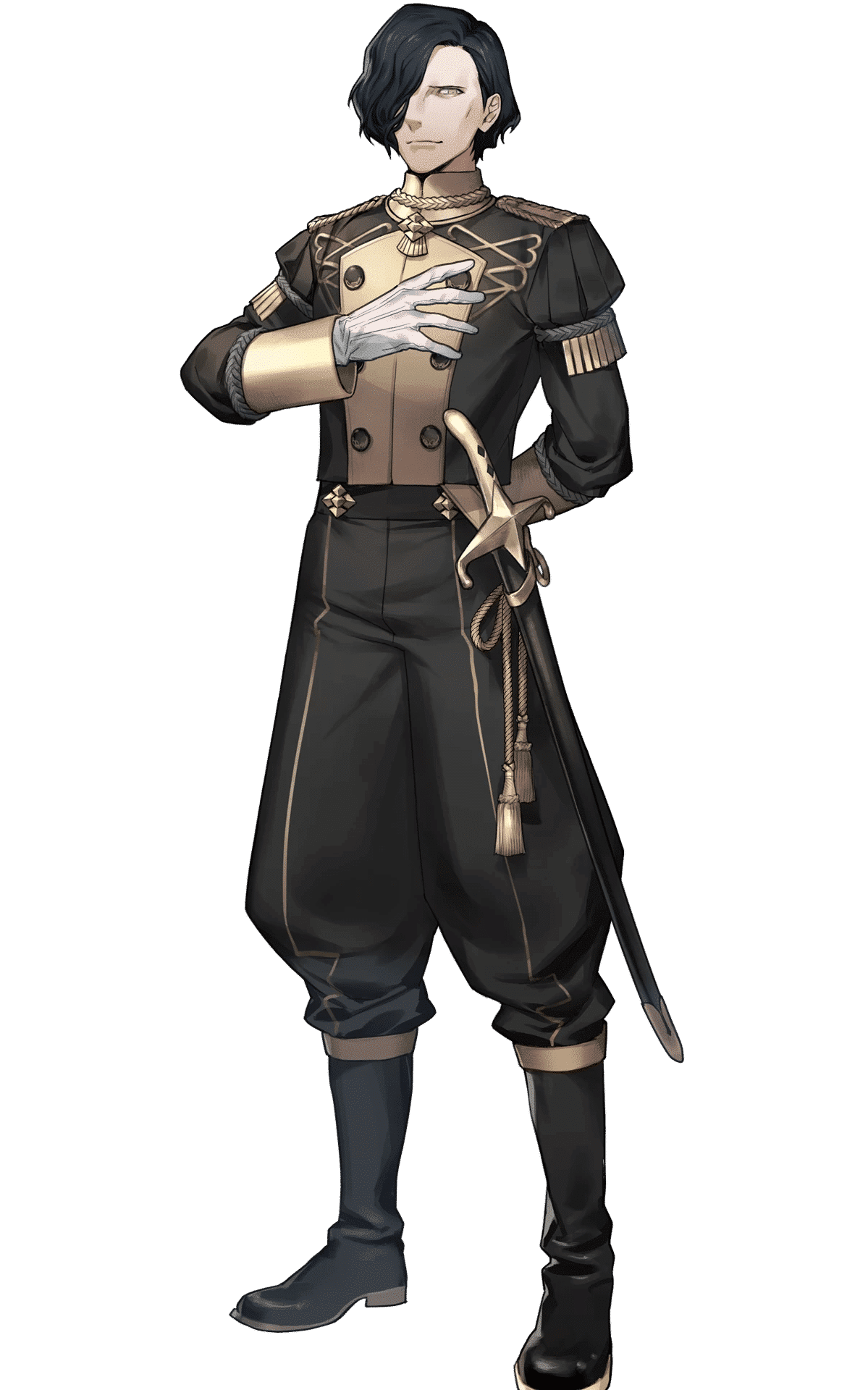
Hubert/Heidrun in An Eagle Among Lions was fun to write in general, right off the bat, because I could take the foundation of his character and spin it off in a totally new direction. That’s what makes writing an Alternate Universe so much fun in the first place. Hubert in canon is such a compelling and rich character, especially his devotion to Edelgard and his fraught and adversarial relationship with religion (one of my favourite bits of environmental storytelling in Three Houses is that when he dies in battle, you find religious paraphernalia on his body – he’s still a man of incredible faith, even if he’s lost faith in the institution of religion). And he’s also hilarious as hell in his own way.
In An Eagle Among Lions, the context of having an entirely different Edelgard to serve meant that I had to think of a new way for Hubert to express those attributes and come up with a new way to explore the idea of Hubert’s devotion and the process of him feeling betrayed by and losing his faith.
Every time I write Fire Emblem fanfiction, I write Hubert as though there’s a tiny Heidrun inside him just waiting to get out. A lot of the ways Hubert performs masculinity just feel very authentic to how a trans woman who isn’t out yet—maybe not even to herself—would do it. Then there are things like how one of his lost items is a straight razor, his secret dream to be a pegasus knight, a female-only class… it’s all very, very, very trans-femme and extremely eggy.
One of the things that struck me as very trans is that Hubert is defined so much by self-denial. In canon, he’s willing to throw everything about himself away for Edelgard’s sake. He wishes to express no desires other than her own, much to her own frustration and chagrin – and that self-denial – that belief that since living your own life and your own dreams are impossible, you might as well live for someone else’s – is also very trans. And that became key to Hubert’s metamorphosis into Heidrun in An Eagle Among Lions.
His decision to travel back in time to complete one of the story’s ongoing time loops gave him a life separated from Edelgard’s side – a life in which he had to find meaning himself while he waited to catch up to the present day. It wasn’t an easy life, but it was the kind of life Heidrun needed in order to come into being.
Funnily enough, Heidrun ended up being a foil to Catherine completely inadvertently. It wasn’t until literally the final chapter Catherine showed up in that I actually realized that I’d set up a very strong thematic link between the two of them. Catherine and Heidrun both ended up having to make new lives out of nothing. The former found her way to Rhea, who moulded her into somebody with no identity outside of her duty to the archbishop; the latter became in a very literal sense a self-made woman who balances undying loyalty with her own independent sense of identity. I wish I’d noticed that sooner; Catherine might have had a bigger role to play in the fic, then!
Edelgard’s siblings were a group of new characters that had to fit seamlessly with an already-packed cast, and are integral to her backstory. How was the experience of creating them?
Edelgard’s siblings were a whole lot of fun to write, especially since there’s absolutely nothing to go on in canon. I came up with all their names and one-sentence descriptions of how each of them met their ends in the fanfic I wrote before An Eagle Among Lions, An Adrestian Tail – in which the villain ended up being one of her siblings who had survived without her knowledge.
I used those little bits I’d invented in that earlier fic as a basis for fleshing out who each of them were. I started out very simple and with broad strokes – Burkhart was the eldest and the crown prince and had a musically gifted twin sister; Joachim was the obnoxious middle sibling; Hedwig was an overly excitable ball of energy whose thoughts and passions moved too fast for the rest of her to keep up with, a precious cinnamon roll, my favorite, and so on.
Then, I fleshed them out on the fly as they responded to the events in the story. Anselm became the leader of a pro-Church faction as part of a ploy to split the Adrestian Empire in half, so that led to his ideology becoming a counterpoint to Edelgard’s own. Burkhart getting married to Cornelia furthered his characterization as a bit of a weak-hearted man who’d been afraid of losing the power he’d spent his entire life being groomed to wield.
Justine got to be the token asshole of the group – but also someone who did care for her little sister Edelgard and ended up being the token member of the group who really felt hurt and betrayed to find out that Edelgard was actually an alternate-universe Edelgard inhabiting her little sister’s body. Immanuel turned out to be a stoner and a walking Big Lebowski reference, a former Walter Sobchak who adopted the doctrine of the Dude, because I thought it was funny. And Hedwig ended up becoming friends with/falling in love with/committing treason for Flayn because I realized that writing the two of them together was really enjoyable and started ‘shipping’ them as Hedwig’s first ill-advised adolescent crush.
Generally, characters who had nothing to build off of in canon, or very little, evolved as they became more involved in the story and I had to ask myself, ‘Okay, how do they react to this, how do they feel about that, etc.’ It’s much trickier than developing canon characters with more presence in the original work because you have to do all of it yourself, from scratch.
It was a similar challenge with other original characters who were wholly made up for the fic, though many of them were inspired very heavily by other characters from other stories – like Vual, who was based on Garak from Star Trek: Deep Space Nine, and Thales Senior and Periander, who were based loosely off of Roy Mustang and Riza Hawkeye from Fullmetal Alchemist.
Lastly, did Ingrid actually manage to cross universes to find Edelgard again? How could you tease us with a cliffhanger like that!
I wanted to leave Ingrid’s fate up to the reader’s imagination – like what I said about stories having gaps in them. Always leave the readers wanting more! I thought ending the fic on the potential (and a very strong hint) that she and Edelgard might see each other again would have been much more powerful than actually writing it out, like how monsters in horror movies are usually scarier when you can’t get a good, clear look at them.
I was also considering an ending à la Thelma and Louise, with the two characters seeing each other and running toward each other but the story ending before they could meet – just like the film’s titular heroines ending the movie in a freeze-frame, suspended in the air, their eventual fates implied but ultimately unknown.
A final note from Willow:
One last thing I want to say about An Eagle Among Lions is that if you’ve ever seen Stargate SG1, there’s a particularly well-liked episode, ‘Citizen Joe,’ which puts an interesting spin on the then-common practice of clip shows. SG1 always had interesting clip shows. In this one, its recap of the series thus far was done through the frame story of an average, everyday guy who somehow develops a psychic link with one of the main characters, Colonel Jack O’Neill, and starts using that link to write stories about O’Neill and the SG1 team’s escapades.
The episode’s main character starts putting out a tremendous, prodigious amount of writing, at first regaling his friends and family with the stories he thinks are coming out of his own imagination and eventually just annoying them. It’s a very sweet episode and a great example of the show’s willingness to be meta and poke fun at itself while lovingly teasing its fandom.
It also reminds me of the writing process for An Eagle Among Lions, because I honestly can’t fully explain how I was able to write 1.6 million words in two and a half years on top of working a full-time job. That’s something I don’t think I’ll ever be able to do again. And in fact, when I look back on the whole story, sometimes it feels as though once I’d gotten into a groove, it simply wrote itself (until I find a typo I didn’t catch before – then I’m reminded that I definitely wrote it myself). It really felt like my muse had taken the wheel… or maybe, somewhere in the multiverse, it’s all true!
